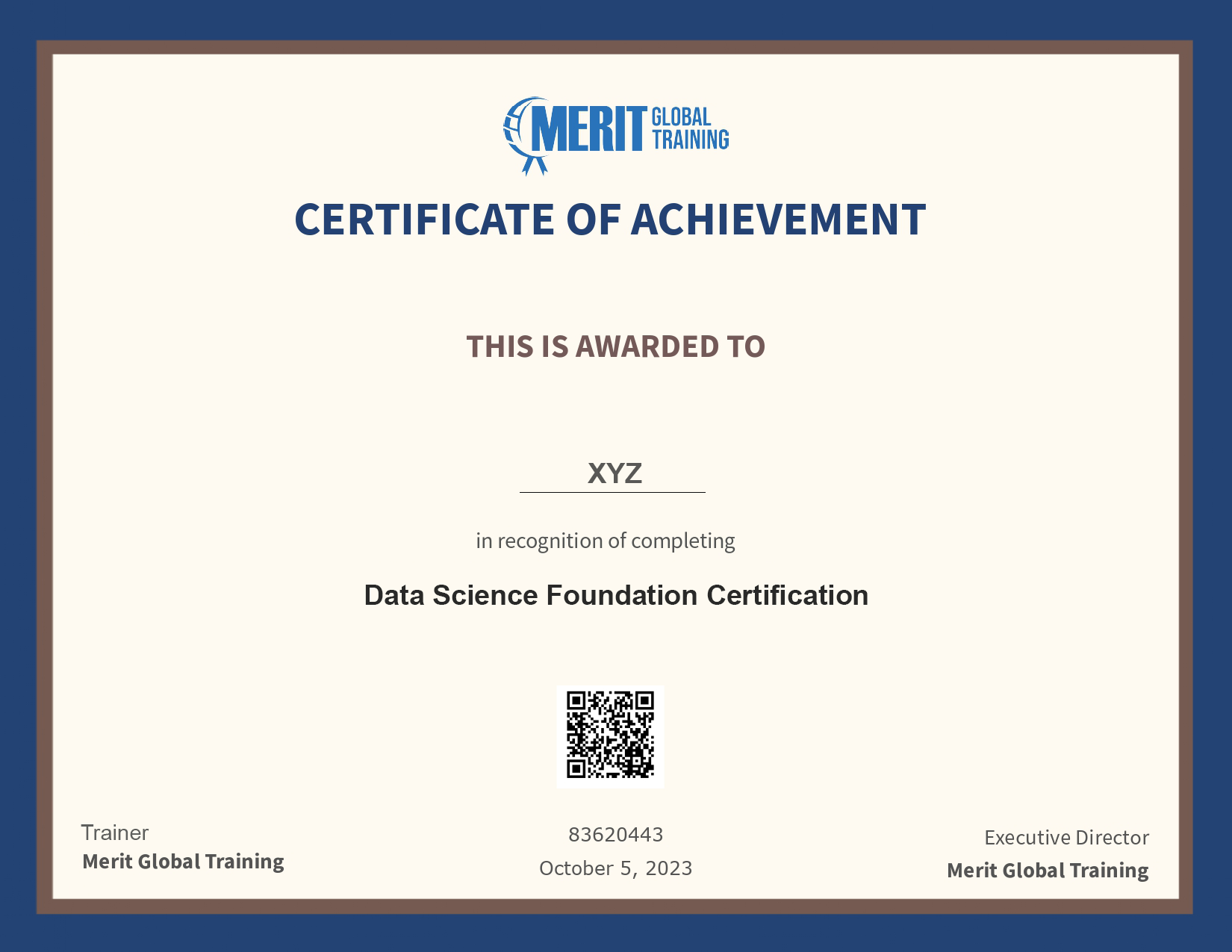- You are here:
- Home
- Data Science Foundation Certification

Data Science Foundation Certification
Get a foundational overview of Data Science principles and concepts.
This foundational course provides a high-level overview of essential Data Science areas. A basic understanding of Data Science from business and technology perspectives is provided, along with an overview of common benefits, challenges, and adoption issues. In this course, you will learn the foundations for Data Science and also learn to use Python - a powerful open-source tool. You will come across interesting concepts like exploratory data analysis, statistics fundamentals, hypothesis testing, regression & classification modeling techniques, and get introduced to machine learning. The course end project and interview prep will make you industry ready. Merit Global Training's Data Science Foundation course will help freshers and seasoned professionals alike to gain a deep understanding of the subject and advance your career.Testimonials
- Data Science Tools & Technologies: Get acquainted with various analysis and visualization tools such as matplotlib and seabo
- Statistics for Data Science: Understand the behavior of data as you build significant models
- Python for Data Science: Learn about the various libraries offered by Python to manipulate data
- Exploratory Data Analysis: Use Python libraries for data preparation and visualizing data
- Advanced Statistics & Predictive Modeling: ANOVA, Linear Regression using OLS, Logistic Regression using MLE, KNN, Decision Trees
- Optimize Model Performance: Enhance the model performance using techniques like Feature Engineering and Regularization
- Dimensionality Reduction: Techniques to find optimum number of components/factors using scree plot, one-eigenvalue criterion
- Basics of Machine Learning: Learn basics of ML techniques; types of learning and learn about scikit learn library
Key Features
Details
- Introduction to Data Science
- Analytics Landscape
- Life Cycle of a Data Science Projects
- Data Science Tools & Technologies
- Measures of Central Tendency
- Measures of Dispersion
- Descriptive Statistics
- Probability Basics
- Marginal Probability
- Bayes Theorem
- Probability Distributions
- Hypothesis Testing
- Install Anaconda
- Data Types & Variables
- String & Regular Expressions
- Python list
- Python dictionaries
- Python set
- Python tuple
- Comprehensions
- For Loop
- While Loop
- Break Statement
- Next Statements
- Repeat Statement
- if, if else Statements
- Switch Statement
- Writing your own functions (UDF)
- Calling Python Functions
- Functions with Arguments
- Calling Python Functions by passing Arguments
- Lambda Functions
- Classes & Objects
- Reading files with Python
- Writing files from Python
- Reading files using Pandas library
- Saving Data using Pandas library
- Clean & Prepare Datasets
- Manipulate Data Frame
- Summarize Data
- Chu Insights from Data
- Charts using Matplotlib
- Charts using Seabo
- Charts using ggplot
- ANOVA
- Linear Regression (OLS)
- Case Study: Linear Regression
- Principal Component Analysis
- Factor Analysis
- Case Study: PCA/FA
- Logistic Regression (MLE)
- Case Study: Logistic Regression
- K-Nearest Neighbor Algorithm
- Case Study: K-Nearest Neighbor Algorithm
- Decision Tree
- Case Study: Decision Tree
- With attributes describing various aspect of residential homes, you are required to build a regression model to predict the property prices.
- Reduce Data Dimensionality for a House Attribute Dataset for more insights & better modeling.
- With various customer attributes describing customer characteristics, build a classification model to predict which customer is likely to default a credit card payment next month. This can help the bank to be proactive in collecting dues.
- Wine comes in various types. With the ingredient composition known, we can build a model to predict the Wine Quality using Decision Tree (Regression Trees).
- Understand Time Series Data
- Visualizing TIme Series Components
- Exponential Smoothing
- Holt's Model
- Holt-Winter's Model
- ARIMA
- Case Study: Time Series Modeling on Stock Price
- What is Machine Learning?
- Supervised Learning
- Unsupervised Learning
- Using Scikit-learn
- Scikit-learn classes
- Case Study: Machine Learning Algorithm
Module 1: Foundation for Data Science
Learning Objectives:Get an idea of what is data science. Get acquainted with various analysis and visualization tools used in data science.
Topics Covered:
Hands-on: No hands-on
Module 2: Probability and Statistics
Learning Objectives:In this module, you will get an overview of basics like mean (expected value), median and mode and will also learn about distribution of data in terms of variance, standard deviation and interquartile range. Get basic summaries about the data and its measures, together with simple graphics analysis. Go on to explore the basics of probability with daily life examples. Learn about Marginal probability and its importance with respect to data science. Learn Baye's theorem and conditional probability, and alternate and null hypotheses with various types of errors.
Topics Covered:
Hands-on: Learn to implement statistical techniques with Microsoft Excel.
Module 3: Basics of Python
Learning Objectives:This module, which covers the basics of Python, teaches how to install Python distribution - Anaconda and gives an understanding of the basic data types, strings & regular expressions.
Topics Covered:
Module 4: Python Built-In Data Structures
Learning Objectives:
Understand the various Data structures that are used in Python.
Topics Covered:
Hands-on: Write Python Code to understand and implement Python Data Structures.
Module 5: Control and Loop Statements in Python
Learning Objectives:In this module, you will learn all about loops and control statements in Python.
Topics Covered:
Hands-on: Write Python Code to implement loop and control structures in R.
Module 6: Functions and Classes in Python
Learning Objectives:Here you will learn to write user-defined functions in Python, including Lambda function. Also learn the object oriented way of writing classes & objects.
Topics Covered:
Hands-on: Write Python Code to create your own custom functions without or with arguments. Know how to call them by passing arguments wherever required.
Module 7: Working with Data
Learning Objectives:Learn how to import datasets into Python. Also learn how to write output into files from Python.
Topics Covered:
Hands-on: Write Python Code to read and write data from/to Python.
Module 8: Analyze Data using Pandas
Learning Objectives:Learn to manipulate & analyze data using Pandas library. Learn how to generate insights from your data.
Topics Covered:
Hands-on: Write Python code to manipulate data frames and chu insights using various Python libraries.
Module 9: Visualize Data
Learning Objectives:You will learn to use various magnificent libraries in Python like Matplotlib, Seabo & ggplot for data visualization.
Topics Covered:
Hands-on: Use Python visualization libraries like Matplotlib, Seabo & ggpplot.
Module 10: Advanced Statistics and Predictive Modeling
Learning Objectives:This module analyses Variance and its practical use, covering strong concepts, model building, evaluating model parameters, measuring performance metrics on Test and Validation set. You will use Linear Regression with Ordinary Least Square Estimate to predict a continuous variable. Further you will learn to enhance model performance by means of various steps like feature engineering & regularization.
Along the way, you will learn about Dimensionality Reduction Technique with Principal Component Analysis and Factor Analysis, including methods to find the optimum number of components/factors using scree plot, one-eigenvalue criterion. You will be able to cement the concepts least through real life case studies with Linear Regression and PCA & FA. Going further, you will explore Binomial Logistic Regression for Binomial Classification Problems, including evaluation of model parameters, model performance using various metrics like sensitivity, specificity, precision, recall, ROC Curve, AUC, KS-Statistics, and Kappa Value. You will work with a real-life case study with Binomial Logistic Regression.
Next, you will learn about KNN Algorithm for Classification Problem, including techniques that are used to find the optimum value for K. You will see a real-life case study with KNN Decision Trees, to help you understand regression & classification problems. At the end of this module you will have working knowledge on Entropy, Information Gain, Standard Deviation reduction, Gini Index, and CHAID, among others.
Topics Covered:
Hands-on:
Module 11: Time Series Forecasting
Learning Objectives:In this module, you will understand Time Series Data and its components like Level Data, Trend Data and Seasonal Data; also work with the Exponential Smoothing Model and know when to use the same. You will know how to use Holt's model when your data has Constant Data, Trend Data and Seasonal Data and learn how to select the right smoothing constants for each set of circumstances. Finally, you will use Autoregressive Integrated Moving Average Model for building a Time Series Model and carry out a real-life case study with ARIMA.
Topics Covered:
Hands-on:
Work on a dataset including features such as symbol, date, close, adj_close, volume of a stock. This data will exhibit characteristics of a time series data. We will use ARIMA to predict the stock prices.
Module 12: Introduction to Machine Learning
Learning Objectives:This module gives you a good understanding of the fundamental issues and challenges of machine learning. You will learn types of machine learning such as Supervised and Unsupervised learning and get an understanding of the strengths and weaknesses of many popular machine learning approaches. Learn to appreciate the underlying relationships within and across Machine Learning algorithms and the paradigms of supervised and unsupervised learning. Cement your understanding of all these concepts with a case study using Scikit Learn libraries for data manipulation & pre-processing.
Topics Covered:
Hands-on:
Use complex datasets to manipulate, prepare and pre-process data for model building exercise. Analyze and treat missing values using various missing value imputation strategies.- Elementary programming knowledge.
- Familiarity with statistics.
Prerequisites
- This course is best suited for:
- Those interested in data science who want to learn essential data science skills.
- Those looking for a more robust, structured data science learning program.
- Data Analysts, Economists, or Researchers working with large datasets.
- Software or Data Engineers are interested in learning the basics of quantitative analysis.
- On successful completion of the course, you will receive a Course Completion Certificate from Merit Global
Certification
- Agile and Scrum Training
- Banking and Finance Training
- Big Data Training
- Business Process Management
- Business Training
- Cloud Computing Courses
- Computer-Aided Design (CAD) Training
- Data Science Training
- Devops Training
- Digital and Innovation Training
- Human Resources
- Insurance Industry Training
- IT Security Training Courses
- Leadership Development
- Oil & Gas Training
- Project Management Training
- Quality Management Training
- Risk Management
- Sales and Marketing Training
- Soft Skills Training
- Software Development
- Supply Chain Management
- Telecom Industry Training
Request a Quote
Feel free to request a quote for corporate in-house programs or our upcoming open events. Write to us at info@meritglobaltraining.com

Request more details

Certificate:

No Open-house Schedules Available At The Moment. Request A Quote For Corporate Group Online Or In-person Training.

Don't Miss Out On Amazing Benefits!
- Why Pay Higher For your Certification Courses when you can get them at much more competitive prices? Take the lowest-price challenge! Submit your Quote.
- Highest Rated For The Quality Training & Services
- 20000+ Certified Every year Through Meritglobal
- Avail Pay Later, EMI Options, Referral Bonus & More

We've successfully received your Message
We revert you shortly
Should your enquiry be urgent, please mail us at info@meritglobaltraining.com or call us +971 50 205 6399 / +91 80885 11977 / +1 863-250-1577

We've successfully received your Message
We revert you shortly
Should your enquiry be urgent, please mail us at info@meritglobaltraining.com or call us +971 50 205 6399 / +91 80885 11977 / +1 863-250-1577
